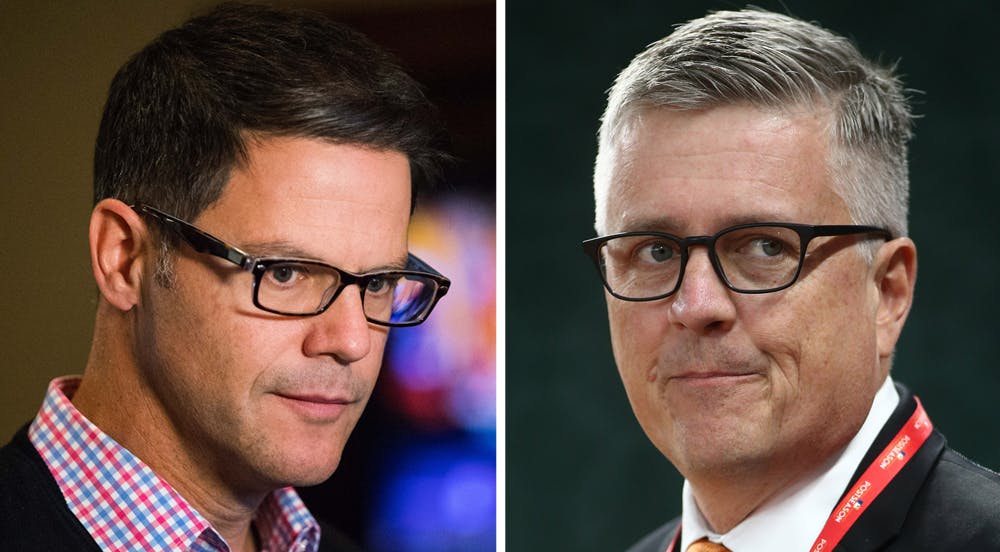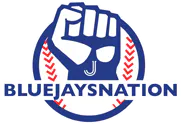Source: #BlueJays decided earlier this season that Roberto Osuna would not pitch for them again at @MLB level following the domestic violence incident. Blue Jays ownership and management decided to make the best trade they could. This was it. @MLBNetwork
Actions speak louder: How the Blue Jays and Astros handled the Osuna trade differently

Photo credit: Mark J. Rebilas/Troy Taormina-USA TODAY Sports
By Ian Hunter
Aug 2, 2018, 08:00 EDTUpdated: Aug 2, 2018, 16:54 EDT
Actions speak louder than words. Telling someone you’re going to do something and actually doing it are two completely different things. Shout, scream, boast or preach your actions from a mountaintop, but if nothing happens, those words are meaningless.
The Toronto Blue Jays and Houston Astros approached the Roberto Osuna transaction with two different philosophies. The Jays’ words were a little tone-deaf a few weeks ago, but ultimately they did the right thing. Those words didn’t correlate with the action that took place on Monday, yet the result spoke volumes.
Then, there’s the Houston Astros. Their words, pedalled by General Manager Jeff Luhnow, trumpeted the team’s “zero tolerance policy” on the day they acquired a player charged with assault and whose criminal investigation is still ongoing. A player who accepted a 75-game suspension from Major League Baseball. A league which doesn’t administer that stiff of a penalty for no good reason.
The Astros’ actions don’t speak louder than their words. Luhnow’s words are hollow. They mean nothing because he contradicted that proclamation by adding Osuna to their roster. Without saying it, Luhnow insinuated that talent trumps all and winning is everything. Richard Griffin put it best: “They have sold their soul for a closer who could divide the clubhouse.”
Two teams with two polar opposite philosophies when it comes to personnel decisions. The Blue Jays, looking to get out from the shadow of this player; the Astros, showing ruthlessness over anything else in the hopes of winning another World Series.
The Blue Jays aren’t complete saints in this scenario. Ross Atkins’ remarks from a few weeks back about Osuna, saying “Roberto is our closer. I see no reason why he wouldn’t be back” are puzzling in hindsight. This was the organization’s only misstep in this situation.
Atkins didn’t need to give the impression that it would be status quo when Osuna returned. Maybe it was all posturing on Atkins’ part, but in retrospect, it was unnecessary and unwise for Atkins to make it seem like the team would welcome back Osuna with open arms.
After the trade, Jon Morosi put out this tweet:
If this is truly what the Blue Jays organization decided internally, they didn’t communicate it publically, which is understandable. With an ongoing investigation, the team couldn’t lambaste Osuna publically because there are legal implications there, but also because it would’ve torpedoed his value completely.
If you thought the Jays didn’t get much from the Astros now, imagine the low-ball offers the Jays would’ve received had they stated Osuna wouldn’t play in a Blue Jays uniform anymore? We’re not privy to what happens behind closed doors at 1 Blue Jays Way. Maybe the team was going to trade Osuna anyway (for any number of reasons) and his arrest was the last straw.
***
The Blue Jays were thrust into this situation unexpectedly. Osuna brought this upon himself by his actions and his former team suffered a consequence. The Jays didn’t ask to be brought into this. Given the complicated nature of an in-season suspension of this nature – something unprecedented in this era – the organization made the best they could of an untenable situation.
On the other hand, you have the Astros. While the Blue Jays had Osuna’s transgressions dumped on their lap, the Astros chose to wade into it, after performing what Luhnow deemed as “unprecedented due diligence”. If that’s the best they could do, the Astros’ due diligence department should be kicked to the curb.
On paper, the Astros get one of the best young closers in baseball to fortify their postseason run. What they add in talent, they also bring in Osuna’s baggage, which weighs tenfold. Up until this transaction, the Astros were the model baseball franchise of 2018. They won a World Series, they have exciting young players, the front office has embraced and excelled in the analytics department. On paper, they just added a 2-3 WAR reliever to their bullpen, but at what cost?
Baseball players talk about being “energized and reinvigorated” when their team makes splashy trades and acquires top-tier talent. The comments from a few anonymous Astros conveyed quite the opposite with Osuna joining their clubhouse. “I think it’s going to be really uncomfortable”, one player told Jenny Dial Creech of the Houston Chronicle.
This trade has the potential to upset the balance in the Astros clubhouse and it’s already a mixed reaction in the locker room towards Osuna’s arrival. If you’re an Astros player, how do you feel about bringing in a player who was arrested for domestic abuse and is still under investigation? Imagine that happened at your workplace; it would make your skin crawl.
It’s the same risk the Blue Jays faced if they let Osuna return to their clubhouse. Were Osuna’s teammates supposed to go back to normal and act like nothing has happened? It projected to make for a toxic environment, which is why the Blue Jays did the right thing and got Osuna out of town.
The problem doesn’t just “go away”. The Astros inherited Osuna and all the baggage, controversy and uncertainty that comes along with him. The 23-year-old also brings his talent to a World Series contender, but the Astros’ front office neglected the former to get the latter.
Atkins and the Blue Jays could’ve handled the optics of the situation a little differently, but they don’t come off looking cold and callous in this case. The Jays don’t deserve a Nobel Peace Prize by any means, but it couldn’t have been easy for them to make that trade.
In life, you take risks. Some are bigger than others. Then, there are risks that aren’t worth taking at all. 28 teams wisely chose that Osuna was not worth the risk. In their pursuit of a second consecutive World Series, the Astros did.
Breaking News
- Blue Jays Nation’s 2026 Pre-Season Prospect Countdown – No. 1: Trey Yesavage
- Instant Reaction: Blue Jays win second game of Spring Training with 7-5 victory over Phillies
- Instant Reaction: Blue Jays fall 5-1 to Yankees in split-squad game
- Blue Jays Nation’s 2026 Pre-Season Prospect Countdown – No. 2: Arjun Nimmala
- Blue Jays: What a succesful 2026 season looks like for Kazuma Okamoto
